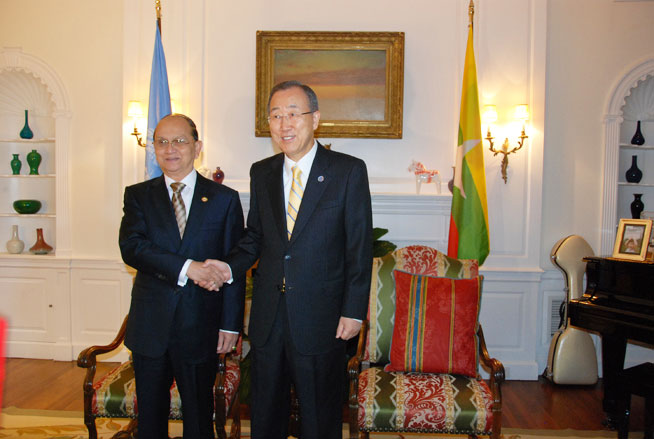United Nations Secretary-General Ban Ki-moon warned Burma’s President Thein Sein the ethnic unrest in Rakhine State could threaten the country’s recent democratic reforms and also spill across international borders.
 Ban made his comment during a meeting this weekend with Thein Sein and the head the Organization of Islamic Cooperation.
Ban made his comment during a meeting this weekend with Thein Sein and the head the Organization of Islamic Cooperation.
He told Ekmeleddin Ihsanoglu, who heads the 57-nation group, the trouble in Rakhine state have potentially wider implications for Burma's reform process and other countries, particularly Bangladesh which is home to tens of thousands of Rohingya refugees.
An OIC committee set up to deal with the Rohingya issue met for the first time in New York called for Rohingyas to be given rights as citizens in Burma this week according to Reuters news agency. Ihsanoglu said he wanted to visit Burma when the government was ready to “to remedy the fundamental rights issues of the Rohingya Muslims.”
Fighting between Rakhine Buddhists and Rohingya Muslims in the state erupted in June, claiming close to 90 people killed and thousands of buildings and homes burned.
At the United Nations General Assembly this week, leaders of Muslim countries called for action to deal with the unrest.
Thein Sein promised Ban that his government would tackle the problem.
Thein Sein was named to head the government in March of last year and began a process of reforming the country after decades of military rule. He told the Voice of America on Saturday that the news media will play an important role in the democratization of Burma.
“We have to thank media because they are telling the stories of the country which the public should know about. By publishing or broadcasting by media, [the] public would understand the situation, and I'm thankful for that,” he said.
An estimated 800,000 Rohingyas in Burma are not recognized as an official ethnic minority by the government. Some Burmese nationals claim they are illegal immigrants from neighboring Bangladesh.
Since the unrest began, a series of Islamic delegations have toured the region and expressed concern about the plight of the Rohingyas while calling for international aid.



